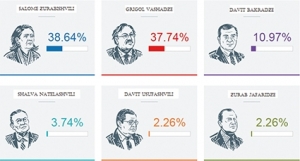Georgia’s 2018 Presidential Election in Numbers
On December 28, the Georgian Central Election Commission (CEC) will hold the second round of the last direct presidential election in Georgia before the constitutional pivot to the indirect election. This change was the last stage of the political reform aiming at replacing the presidential political system with the parliamentary one. The president’s powers in the new system are extremely limited and largely symbolic. Nevertheless, political parties consider the presidential elections of 2018 to be a rehearsal before the more influential parliamentary elections of 2020 and, therefore, the battle for the presidency seems to be much more intense than one could imagine before the first round.
According to the CEC, slightly more than 1.6 million Georgians voted in the presidential elections with one of the highest attendance rates in Georgia’s recent history - 46.74%. The main competition was between Salome Zurabishvili, an independent candidate supported by the incumbent political party Georgian Dream (GD) and Grigol Vashadze, an oppositional candidate nominated by the United National Movement (UNM) and nine other opposition parties. The battle was so tight that none of the candidates were able to cross the 50% threshold to win the first round, and the difference between the two leading candidates was even less than one percentage point: Salome Zurabishvili got 38.64% of the total votes, while Grigol Vashadze only slightly below that at 37.74%.
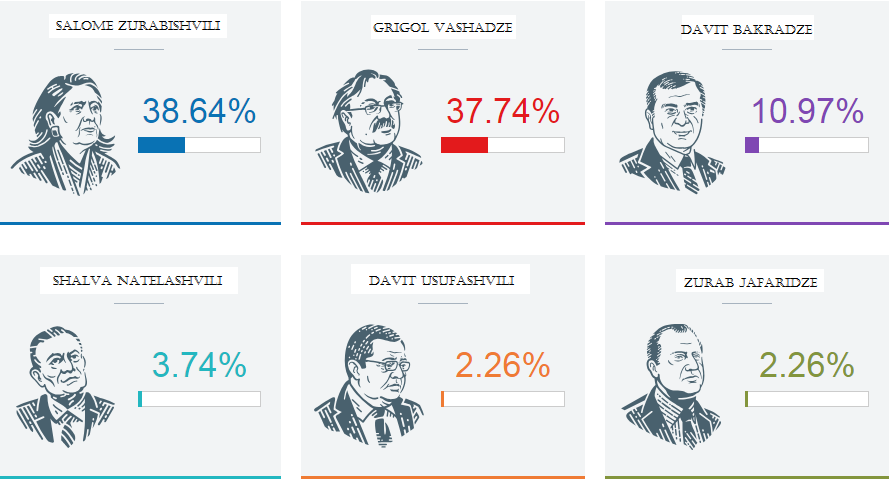
The results were totally unexpected for the leaders of the ruling political party. The Georgian people had seemed to be quite loyal to the incumbent party, allowing them to reach a constitutional majority in the recent parliamentary elections (2016) and rule nearly all of the Georgian municipalities in the recent local self-government election (2017). The confidence in victory was so high that the leaders of the Georgian Dream were barely involved in the pre-election campaign, not nominating their own candidate and supporting an independent one in Salome Zurabishvili.
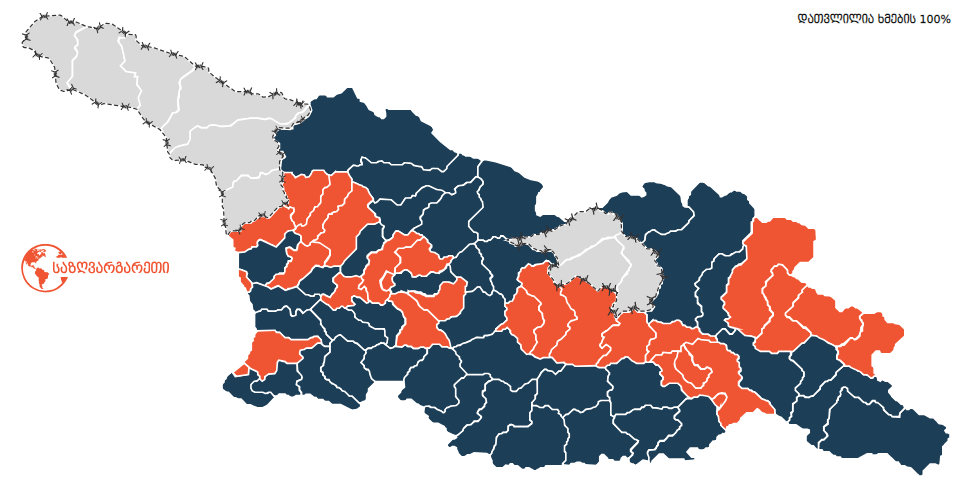
Politicians and analysts identify three main reasons that might explain the failure of the ruling political party in the first round of the presidential election. First, even the leaders of the incumbent party recognize that socio-economic problems (poverty, unemployment, inequality, depreciation of the national currency, over-indebtedness, inflation, etc.) made people dissatisfied with the government’s performance. Second, some of the Zurabishvili’s statements regarding the Russia-Georgia war in 2008 were not acceptable to a large part of society. Third, the opposition parties mounted an aggressive pre-election campaign to discredit the candidate supported by the ruling party. The following paragraphs will look in-depth at the statistical information about the results of the first round of the presidential election and the distribution of votes regarding the different characteristics.
It is widely recognized that incumbents have a structural advantage over challengers during elections. This phenomenon is known as an incumbency advantage. The source of the incumbency advantage might be name recognition, easier access to the campaign finance, access to the government resources that can indirectly boost a campaign, and sometimes even the possibility to determine the timing of the election. Some aspects of the incumbency advantage are common not only for the developing countries but also for western democracies.
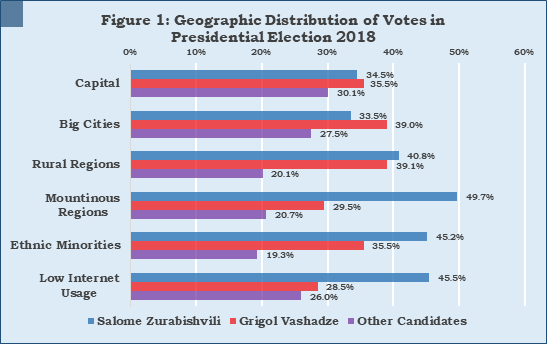
Despite the incumbency advantage, the votes in the first round of the presidential election were quite evenly distributed between the two leading candidates. The only region where the candidate endorsed by the ruling political party received more than 50% of the votes was Samtskhe-Javakheti region, while the leading opposition candidate collected slightly more than half of the votes in the Georgian polling stations abroad.
Moreover, the capital, as well as the four largest cities in the country, voted for the leading opposition candidate, while the rural population (and people living in small towns) voted for the candidate supported by the incumbent party. Mountainous regions and ethnic minorities were a solidly pro-Georgian Dream-backed presidential candidate (these regions usually vote for whoever is currently in power), moreover, Salome Zurabishvili managed to collect a notably higher number of votes than the main opponent in the regions where the majority of the population has low internet usage.
It is interesting to observe the distribution of votes based on their economic sentiments and expectations. According to the Integrated Household Survey (IHS), the percentage of the people claiming that the financial state of their family worsens in 2017 amounted to 41.7%, while for 52.4% of the sample the financial statement did not change at all, and 5.9% of surveyed people experienced financial improvement. The pessimistic sentiment of the Georgian population could potentially have a negative impact on the votes of the presidential candidate supported by the incumbent political party. Nevertheless, the votes are quite evenly distributed between regions with a significantly higher amount of people with the positive or negative sentiment. Still, as it was expected, the leading opposition candidate slightly outperformed Georgian Dream-backed independent candidate in the regions where significantly more people had negative sentiments compared to the national average. In addition, Vashadze managed to collect more votes than the Zurabishvili in the regions where the majority of the people cannot satisfy basic needs and have limited access to the water and gas supply infrastructure.
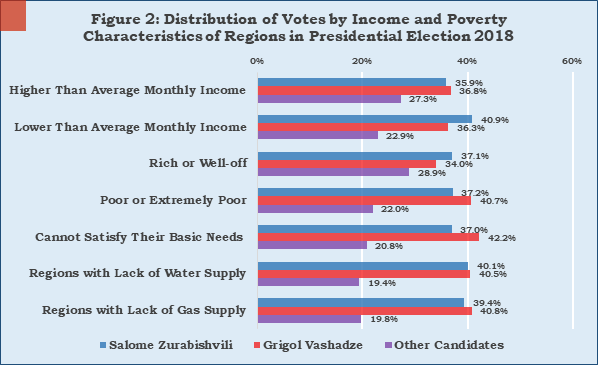
Grigol Vashadze slightly outperformed Salome Zurabishvili in the regions where significantly more people had either negative expectations about the future financial state or expected no changes. However, the candidate supported by the ruling political party managed to dominate in the regions were significantly more people were optimistic about the future financial state.
Let the interpreting of this statistical information be upon the reader. Though there are only a few days left before the second round of the presidential election, it is quite hard to predict who will be the fifth president of Georgia. The only thing that we can say boldly is that voters will have to make a very difficult decision and regardless of the results of the election, the ruling party should take a valuable lesson from the election process to better prepare for the (more decisive) upcoming parliamentary elections.
By Davit Keshelava
Source: https://on.ge/elections/2018/results











